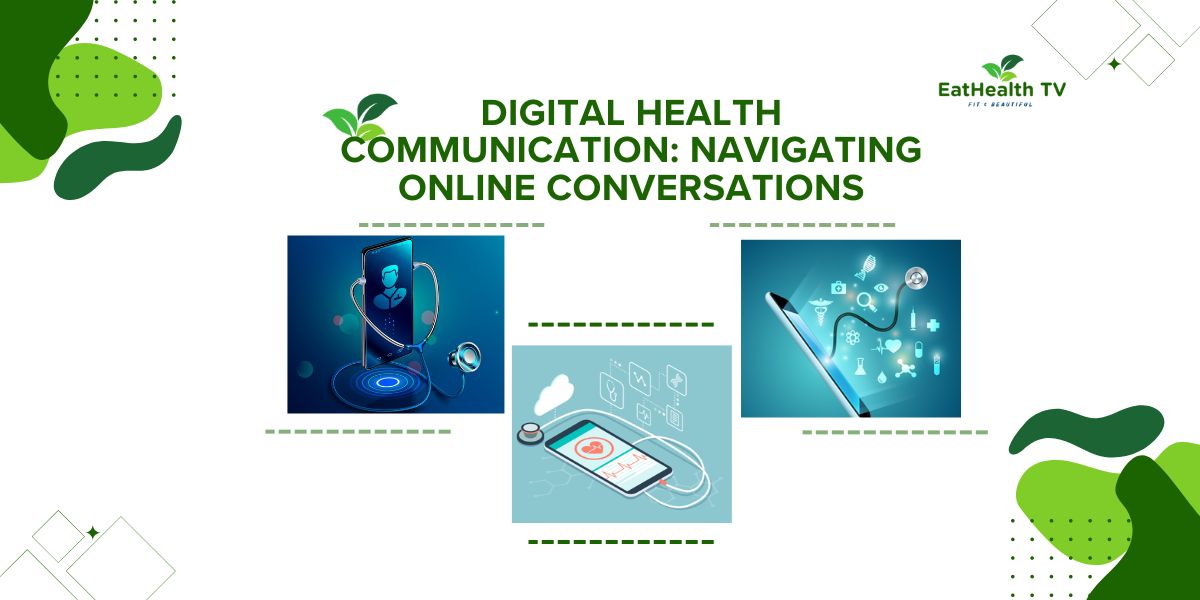Digital Health Communication: Navigating Online Conversations
Navigating the Digital Health Landscape: Strategies for Informed Engagement

Digital Health Communication: Navigating Online Conversations
In today’s digital age, the internet has transformed the way we access information, connect with others, and manage our health. With the rise of online platforms and social media, digital health communication has become increasingly prevalent, offering opportunities for individuals to seek health information, share experiences, and engage in discussions about various health topics. However, navigating online conversations about health requires careful consideration of the credibility of sources, the accuracy of information, and the potential impact on individuals’ health beliefs and behaviors. In this comprehensive guide, we will explore the intricacies of digital health communication, examining the benefits, challenges, and best practices for engaging in online discussions about health.
Understanding Digital Health Communication
Digital health communication encompasses the use of digital technologies, such as websites, social media, mobile apps, and online forums, to disseminate health information, facilitate patient-provider communication, and promote health behaviors. From health-related websites and blogs to social media platforms like Facebook, Twitter, and Instagram, individuals have access to a vast array of resources and platforms for engaging in discussions about health and wellness. While digital health communication offers numerous benefits, such as increased access to information and social support, it also presents challenges related to the quality, accuracy, and trustworthiness of online content. Just as we know Political Systems and Public Health: A Crucial Connection?
The Benefits of Digital Health Communication
- Access to Information: Digital platforms provide individuals with access to a wealth of health information, ranging from general wellness tips to specific medical conditions and treatments. This information can empower individuals to make informed decisions about their health and well-being.
- Social Support: Online communities and support groups offer individuals the opportunity to connect with others who share similar health concerns or experiences. These communities can provide emotional support, practical advice, and a sense of belonging to individuals facing health challenges.
- Patient Education: Digital health communication tools, such as interactive websites, videos, and mobile apps, can be valuable resources for patient education. These tools can help individuals learn about their medical conditions, treatment options, and self-care strategies in an accessible and engaging format.
- Health Promotion: Social media platforms and digital campaigns can be effective tools for promoting healthy behaviors and raising awareness about public health issues. By leveraging social networks and online communities, health organizations can reach a wider audience and encourage positive health behaviors.
- Remote Consultations: Telehealth services and online consultations allow individuals to access healthcare services remotely, eliminating barriers such as geographical distance and transportation issues. These services can improve access to care, particularly for individuals in rural or underserved areas.
Challenges and Considerations
- Quality of Information: The abundance of health information available online can make it challenging for individuals to discern credible sources from misinformation or pseudoscience. It’s essential for individuals to critically evaluate the credibility and accuracy of online content before accepting it as reliable information.
- Privacy and Security: Sharing personal health information online can pose risks to privacy and security. Individuals should be cautious about sharing sensitive health information on public platforms and ensure that they are using secure communication channels when interacting with healthcare providers online.
- Digital Divide: Not everyone has equal access to digital technologies and online resources, which can exacerbate health disparities. It’s important to consider the digital divide and ensure that digital health communication initiatives are accessible to all individuals, regardless of socioeconomic status or technological literacy.
- Health Misinformation: The spread of health misinformation and conspiracy theories online can undermine public health efforts and contribute to vaccine hesitancy, treatment refusal, and other negative health outcomes. Combatting health misinformation requires a concerted effort from healthcare providers, public health authorities, and digital platforms to promote accurate information and debunk false claims.
Best Practices for Engaging in Online Health Conversations
- Evaluate the Source: Before sharing or relying on health information found online, critically evaluate the credibility of the source. Look for information from reputable organizations, such as government agencies, medical associations, and academic institutions.
- Verify Information: Cross-reference information from multiple sources to verify its accuracy and reliability. Be wary of sensationalist headlines, anecdotal evidence, and claims that seem too good to be true.
- Promote Digital Literacy: Educate yourself and others about digital literacy skills, such as fact-checking, critical thinking, and media literacy. Encourage skepticism and curiosity when encountering health information online.
- Engage Responsibly: When participating in online health discussions, communicate respectfully and responsibly. Avoid spreading rumors or misinformation, and be mindful of the potential impact of your words on others’ health beliefs and behaviors.
- Seek Professional Guidance: If you have questions or concerns about your health, consult a qualified healthcare professional rather than relying solely on information found online. Healthcare providers can provide personalized guidance and evidence-based recommendations tailored to your individual needs.
Conclusion
In conclusion, digital health communication offers unprecedented opportunities for individuals to access information, connect with others, and engage in discussions about health and wellness. However, navigating online conversations about health requires critical thinking, digital literacy, and a discerning eye for credible sources. By promoting digital literacy skills, advocating for responsible online behavior, and collaborating with healthcare providers and digital platforms, individuals can harness the potential of digital health communication to promote positive health outcomes and empower informed decision-making. As we continue to navigate the ever-evolving landscape of digital health communication, let us strive to foster a culture of accuracy, transparency, and collaboration in online health conversations.




